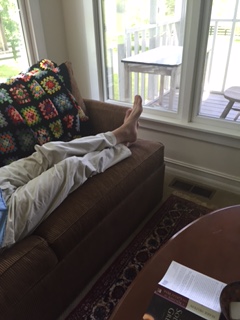

Ralph and I have our best conversation while driving, the same way my kids and I did, and for the same reasons: we have each other’s undivided attention and we can’t escape.
So of course I was maneuvering my way through rush hour traffic the other day when he brought up his concern that his IQ has dropped seven points since what it was when he was a boy—this statistical tidbit from his first diagnostic testing lodged in his brain three years ago; he’s brought it up occasionally ever since but rarely so bluntly.
I responded that most people’s IQs probably drop as they get older, then added as an afterthought (how I tend to break bad news) that his memory loss has probably made his drop worse. He nodded. When I used the term Mild Cognitive Impairment, he flinched, but only slightly. (We don’t use the word Alzheimer’s aloud in our house.)
He brought up how well his medications Namenda and Donepezil have worked. He also said he was wasn’t worried that eventually they might stop working as well because his doctor had assured him that there will be new drugs in the process being discovered and he can take them when these stopped being effective—I don’t recall the doctor saying that exactly but I didn’t contradict him because, after all, who knows?
Then he took a puff of his e-cigarette and said, “Anyway, I’m content.”
“Did you say content?” I asked.
“Yes, I am very content these days.”
I could tell he meant what he was saying, not “fluffing the goods” as he likes to describe people whose stories he doesn’t believe. I felt glad for him, and definitely relieved.
But also, I have to admit, I was a bit jealous. Ok, a little resentful too.
Because I am not content with my life these days. It’s fine to be told what a good, caring wife I’ve become, but it’s kind of a backhanded compliment coming from friends with exciting careers going full steam ahead. Not that my career was ever that full of steam, but my ambitions have flagged. I find myself drifting along, adjusting my rhythm to Ralph’s, wondering if my own days of productivity are over along with his.
I’d rather blame the heat. Maybe once the temperature drops below ninety I’ll be full of focus and energy again, ready to care for Ralph and myself with equal vigor. I’m going to borrow from Ralph’s new playbook and assume the best….
I can appreciate the frustration you feel when a spouse doesnt or can’t carry his share of the load. Just having someone to bounce thoughts off, problem solve and either worry with you or dispell your worries can mean a lot. Glad he feels content as expect a more calm place to be for both of you.
LikeLike
Thanks. Funny how that frustration has turned off for now. So guess you are right about a calm place for both…
LikeLike
I am happy to read all of these everyday stories that are carbon copies of mine but I am still left feeling like my marriage falling apart is my fault. No one seems to be angry. I was 52 years old when my husband had a stroke. Because he didn’t feel the need to take care of himself he grew to be 200 lbs., got high blood pressure and high cholesterol. I now work 6 days a week, our savings is gone, more money is going out then what’s coming in, he is not the man I married , sleeps till noon everyday and no longer has feelings of any kind. I pretty much am his mother. I can’t get rid of the anger and resentment. Doesn’t anyone feel like they are in mourning?
LikeLike
Please do not feel that it is your fault. And frankly I admire your courage in expressing your anger and resentment. I am aware of a tendency to sugarcoat those feelings when I write online. That shift from wife to mother (or husband to mother for men caregivers frankly) of the man you married is something no one can prepare for. The idea of being in mourning makes complete sense. I hesitate to offer advice to anyone and it sounds as if your time is really as tight as your finances, but you may find a support group–which doesn’t cost money– would be a place to vent a little of your frustration. In any case, feel free to vent here or to my contact email as much as you need. I find if I let out a little of my steam, it does help…
LikeLike
Before mom died 5 years ago, she told me of a conversation with dad who had mixed Alzheimer’s Disease and vascular dementia. Mom spent a lot of time worrying about all sorts of things. She worried about my siblings and their hording. She worried about money. Etc. She said she was having trouble sleeping due to the worry. Dad said he didn’t worry at all and he slept well. That set mom off though she didn’t say that to him. She told me she resented the fact that she spent so much time worrying while he slept so well.
I guess I laughed and reminded her that dad couldn’t do any of the things she did. He couldn’t handle money. He couldn’t shop and could hardly cook. He was content to sit in his Lazy Boy all day. Mom said it would make her feel better if he could share the worrying with her. I think the real issue is that she was alone trying to make everything work. Dad didn’t worry because he couldn’t hold onto those worried thoughts. And he knew mom would take care of him. So he remained content. After mom died, dad was concerned for several days about who would take care of him. After I assured him every day that I would be taking care of him, he went back to his contentment. I did the worrying for both of us, just as mom had done.
It isn’t easy to be a caretaker. But the reward is knowing that the job is being done. Now that dad is gone, I am thankful that I was there for him, even when I wished I could be out having fun vacations, etc. I know it is hard for you now and I give you a lot of credit for doing all the work, the worrying and blogging too – sharing the information with the rest of us. We learn from each other and hopefully support each other. Hang in there. You will be glad you did. (And ask for help from family and friends when you feel overwhelmed. You need a break once in awhile too!)
LikeLike
Thanks for your note. I can picture your dad so well from your note. And you are right about the reward as well.
LikeLike
Thank you so much for your thoughts. I am new to this journey with a spouse with cognitive impairment and it really helped to hear your thoughts about your spouse & father’s sense of contentment & your own emotions-I hadn’t thought about the fact that my husband who used to be somewhat of a worrier appears happier to us all & that this may well be because he can’t hold on to his “worries” – a gift in the midst of losses! Alice
LikeLike
Thanks so much for writing. The new calm is a gift, but there’s a caveat I should have added to my post–Ralph and others in his situation may not hold on to the same worries they used to and may be happier most of the time, but sometimes a new, even trivial worry grabs hold and won’t let go.
LikeLike
Think how much worse it would be if Ralph was full of resentement rather than feeling content – though I understand why you are not feeling content with life right now. Wouldn’t mind some of your heat – today I’ve been wearing a teeshirt under a sweatshirt under a rain jacket!
LikeLike
You are so right (as usual). I will take contentment over resentment any day. Many dealing with their own cognitive impairment are understandably resentful and angry. My own piddly complaints are minor. I bring them up because the are inevitable and I want others not to feel alone or guilty when their own moments of resentment strike…Thanks for writing. And important point to clarify….
LikeLike
I have observed that when my husband says something that is not quite accurate, it seems to be his brain trying to make sense of things. I can only imagine, but I’m guessing that the working brain kind of “fills in the blanks” when necessary in order to make sense of the world.
Like you, I do not correct when something is said that is not accurate. After all, what does it matter? I imagine it would get pretty depressing to have someone correcting you all day long. Now of course if it is something important, I’ll find a way to try to clear up the misinformation.
I hear what you’re saying about the contentment factor. I have to work at it too. And, as the disease progresses, I’m guessing it will become even more of a challenge. Thanks for writing Alice. I always appreciate your posts.
LikeLike
Thanks. You and I seem to be in very similar situations and take very similar approaches.
LikeLike
Appreciated your comment about how depressing it would be to be corrected all day & your theory about his brain trying to “fill in the blanks”….I’m fairly new to the journey of dealing with my 61 yr old husband with MCI & finding this blog has been a real gift! Alice too
LikeLike
I am so glad you found me too. Those of us dealing with men who are struck by cognitive impairment early may have a slightly different road we travel than many caregivers of older spouses/parents. We are still feeling in our prime in so many ways and at the same time we are facing the beginning of natural aging as well.Please keep commenting. I think the dialogue is as important (and often at least as insightful) as my posts.
LikeLike